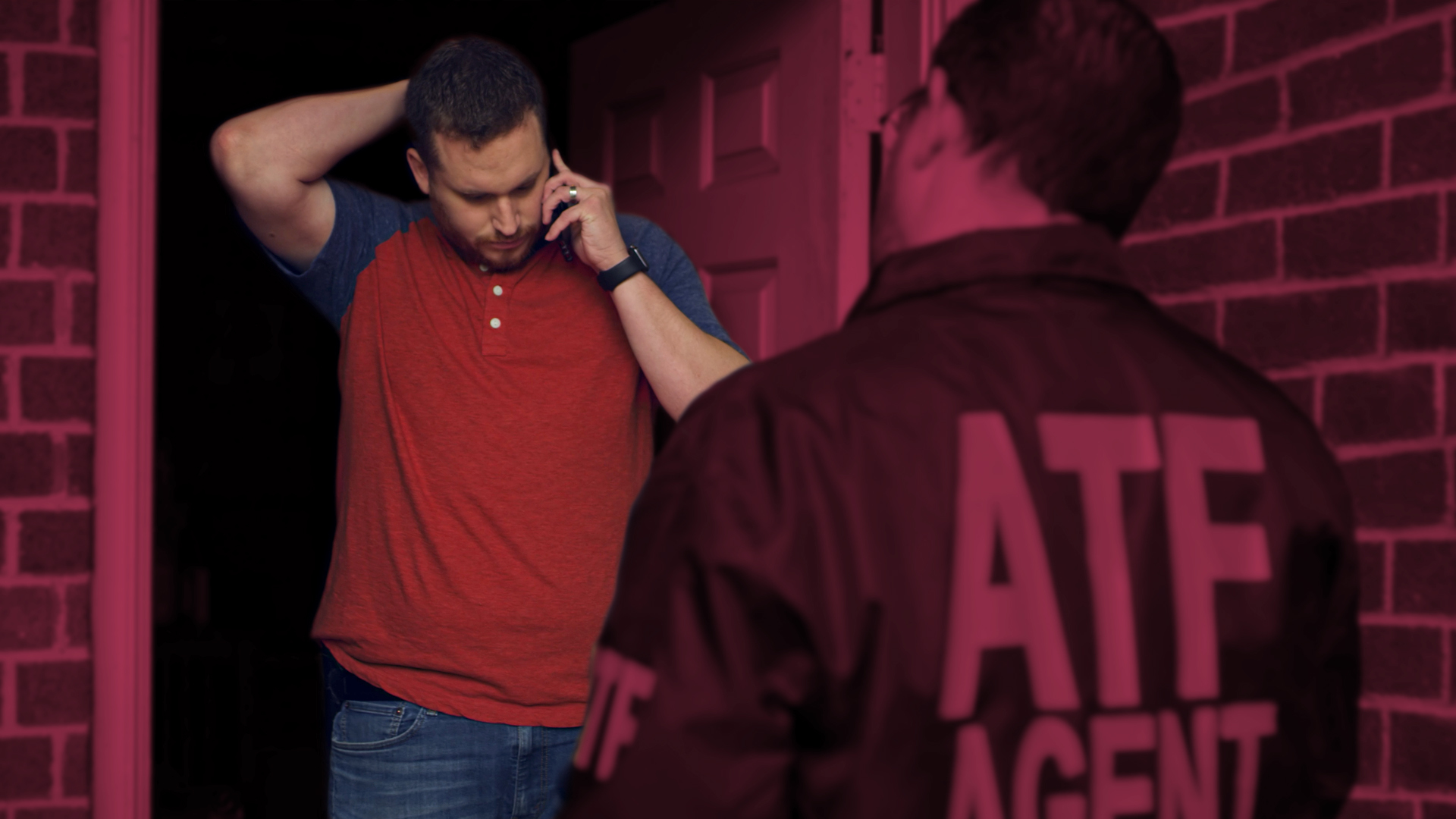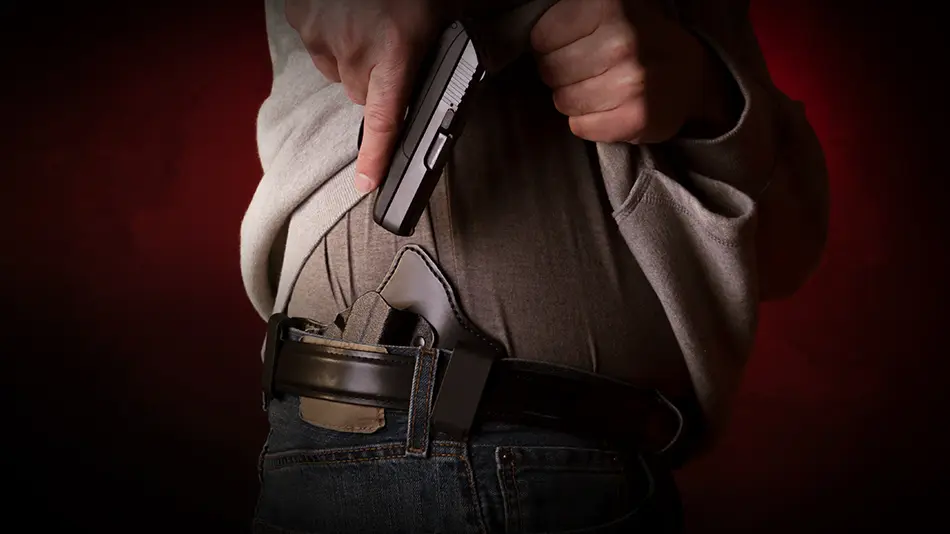
What do you do if an ATF agent shows up to your home, flashes a badge, and demands to see what is inside your gun safe? What if they ask you for a specific firearm or a firearm component? Do you surrender it to them?
Today we're going to discuss the three most common reasons the ATF might be knocking at your door, and what you should do to be prepared should you ever find yourself in these situations.
Reason 1: Firearm Tracing
The first and most common reason we see the ATF attempting to question a person, seemingly at random, is firearm tracing.
When you buy a firearm from an FFL and it later leaves your inventory, there may not be a record. Whether it is a sale, gift, inheritance, or the gun was lost or stolen, there are a lot of reasons why a person may no longer have a gun in their collection. But if the gun shows up at a crime scene sometime down the road, it is common for local police and the ATF to trace that firearm back to the original point of sale from the FFL.
That means if you were the original purchaser, the ATF might have some questions as to why the gun is no longer in your possession.
Reason 2: Investigating the Purchase of Multiple Firearms
Under the 1968 Gun Control Act, FFLs are required to report multiple sales of handguns to the same purchaser. Have you ever thought about buying a set of His and Hers pistols? Or maybe you go into a gun store to buy a handgun, and you see a deal on another one that you just can't pass up.
There's nothing wrong with a thoughtful gift or getting a deal, but there is something important you must know.
The sale or disposition of two or more handguns must be reported to ATF home inspections and the ATF and local authorities if they occur at the same time, or within five consecutive business days.
The same goes for certain rifles sold in southern border states. This is because the ATF keeps a close watch on the transfer of multiple firearms that take place in a short period of time. This is to prevent weapons trafficking, unlicensed firearms businesses, and to protect public safety.
Whatever the reason may be, just know if you find yourself in this situation, the ATF and the local police may want to inspect your collection, and you need to know what to do.
Reason 3: Conducting a Welfare Check or Following Up On An Anonymous Tip
You do not need us to tell you that there are some folks who don't believe in the Second Amendment and your right to keep and bear arms. Maybe it is a concerned neighbor, a revenge-seeking ex-spouse, or in response to a political argument over the internet.
We've seen them all. These checks can be about anything—just use your imagination. Whatever the reason, know that law enforcement takes these calls very seriously and it frequently leads to an agent on your front porch asking for your side of the story.
What you need to know is that ATF interactions can be scary, especially when you don't know the nature of the investigation.
Often, we see folks unintentionally implicate themselves in something totally unrelated.
That is why the time to prepare is now. In each of the scenarios, you will want to speak with your attorney prior to any questioning, and you want your attorney present with you if the police or ATF want to continue questioning you down at headquarters. Whether or not you should answer those questions, comply with an investigation, consent to a search, or surrender an item, will vary case by case.
That is why it is imperative you speak to an attorney before making any statements to an ATF agent. In most of these cases, the agent will be willing to arrange a meeting, giving you enough time to consult with an attorney before being questioned.
So, exercise your rights and consult an attorney.
With our brand new, GunOwner Identity Theft Coverage, Independent Program Attorneys will help you navigate the legal aftermath of a lost or stolen firearm, stolen identity, or even misidentification—all to help ensure your Second Amendment rights are preserved and intact.
And as always, if you have any questions about how a lost or stolen firearm, stolen identity, or misidentification can affect your right to bear arms, call us and ask to speak with your Independent Program Attorney.
The information provided in this publication is intended to provide general information to individuals and is not legal advice. The information included in this publication may not be quoted or referred to in any other publication without the prior written consent of U.S. LawShield, to be given or withheld at our discretion. The information is not a substitute for, and does not replace the advice or representation of a licensed attorney. We strive to ensure the information included in this publication is accurate and current, however, no claim is made to the accuracy of the information and we are not responsible for any consequences that may result from the use of information in this publication. The use of this publication does not create an attorney-client relationship between U.S. LawShield, any independent program attorney, and any individual.





The question that you didn’t answer is this, “Am I within my rights to ask to see a warrant and/or to ask for an explanation of their visit?”
In Ohio is there an ATF law that you can not carry bullets from the shelf in the store to another person in the store who purchased them? ATF officers are questioning my son because they saw such an incident on camera in a Columbus gun store.
Article never answered the original question of what our rights are if atf showed up, but clearly closed with an add about insurance.
Forty-one years ago, I was a resident of NYC. I owned a Remington Nylon 66, .22 caliber rifle, which I sold privately to an individual while confirming to all the regulations mandated by NYC’s Firearms Control Board. To this day, I have the carbon receipt with the name and signature of the purchaser along with the serial number, etc. of the rifle. Lesson: Keep paperwork of firearms transactions FOREVER!!!!!
Very informative. I did not know when you buy two or more weapons it is reported to the ATF. Great job US law Shield.
And they say there is no national registry of firearms…
The article didn’t mention if our regular coverage through “us LawShield “ covered getting an attorney, because that would be an expense that you would incur.
I would appreciate questions being answered like do they need a warrant to gain access to a private residence, rather than just one of your ads for more insurance. When we signed up for your initial family plan for $250 a year we were told we were covered and we had access to an attorney etc. etc. is this no longer true?
It’s clear that we should call a program attorney. It’s not clear if our existing membership allows this call. Do we have to buy the new insurance product to get advice if the ATF shows up?
So, are you saying regular lawshield coverage does not include any legal advice under such circumstances.?
Any time any law enforcement agency comes to your house and request you comply to a search for weapons, legally possessed and purchased you have the right to refuse entry to your home. If they are asking it means that they have no probable cause to obtain a search warrant to enter so they depend on your fear and compliance. Coos are not your friends and although most cops are there to do a good job there is no reason why you should comply to a search of your residence. Ask for a warrant and if they don’t have one say politely go get one and come back. The 5th amendment protects you from self incrimination while the 4th protects you from unlawful searches and seizures. If you are intimidated you will lose the battle. Just think if they had probable cause to enter they wouldn’t be asking you for permission.
Thank for advices.
This just happened two atf just flashed a badge asked to come in… I know I’m a good person no reason for concern they did not say that they were there for any kind of Trace… Or that they were even at my home for any bad reason they gave me some b******* about they were just checking up paperwork to make sure that the stores weren’t doing something shady as far as sales showed me zero paperwork except for one that asked me if that was my handwriting didn’t disclose any information they had with them and completely bullied me into tears .. when I realized my gun was stolen … They told they didn’t want me file a report if theft because that was just create too much work for them and they would have to go and file stuff and follow up on things and put someone outside my house or something completely rediculous this conversation goes on for an hour while I’m crying in my kitchen being intimidated and interrogated about people from 5 years ago in my past that have a shady record kind of that I don’t even associate anymore .. proceeded to to say well if I want to do that and then it comes back that something wasn’t right and then I’m going to be going to jail because I didn’t follow what they’re telling me to do right now even though I said well what if somebody gets hurt and there’s no report by me …. which up by the way never being told that the guns were in their possession from a crime or bust but just continuously being told to I will have to the end of the week because I need to make sure that I have my thoughts straight and then I know what I’m telling them because they are flat out accusingly me telling me I’m lying telling to stop talking listen to them only let them talk…. I’m was a complete wreck crying and feeling like I was the criminal in my own home!! After I invite them into my home answering questions without even being told any information.. and their story changed two and three times where they said one thing all know I’m sorry no this is what it was oh no we might have your gun oh wait I don’t know if we do? ! Nintendent telling me not to even file a police report that no that’s too much work for them because they are right always when they were lying to my face and not even telling why they were even there that makes me not even want to be a gun owner
This is frightening. I did not know this law existed allowing them to search for guns bought within 5 days. A FFL told I can buy as many guns as I want per day. 1 or 2 or more than 2.
In the event ANY LEO shows up on your doorstep. Be polite. Ask for identification and if they possess a warrant. If they do not possess a warrant, deny them access and tell them you want an attorney. Then STOP. Do not answer ANY questions or provide any other information. DO NOT allow them in home or on your property without a warrant. Some will threaten and harass you. Be cooperative, polite yet firm. Do not antagonize LEOs
To bad political maneuvering has let to so many people being afraid. In my state of Oregon, the majority are Dems (many my friends) but they tend to be from the more populated areas and the media has long realized that fear sells and boy do they sell. Keep up the good info, hopefully those not too afraid of their own shadow will listen.
If you tell no lie you don’t have to remember anything.💙💙💙support your policemen.